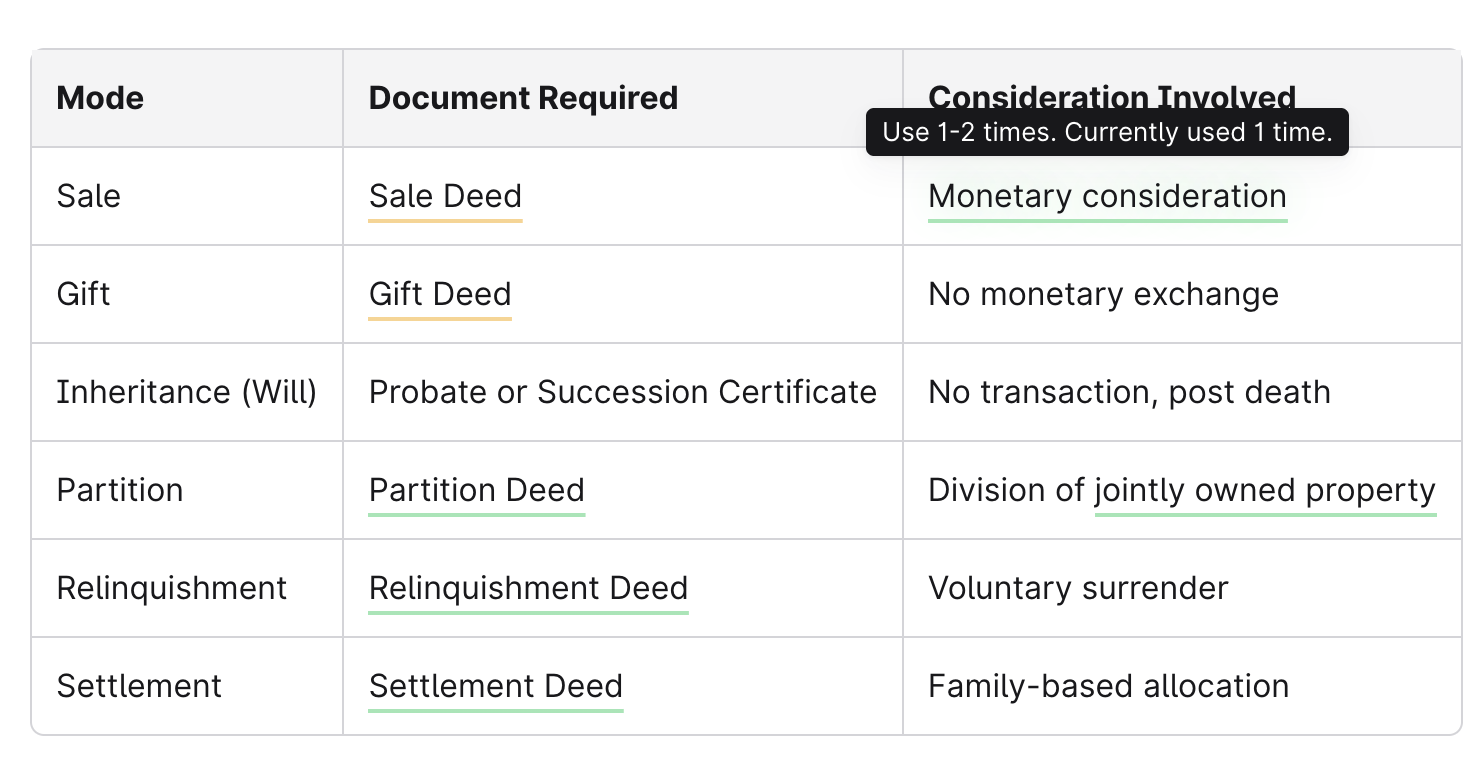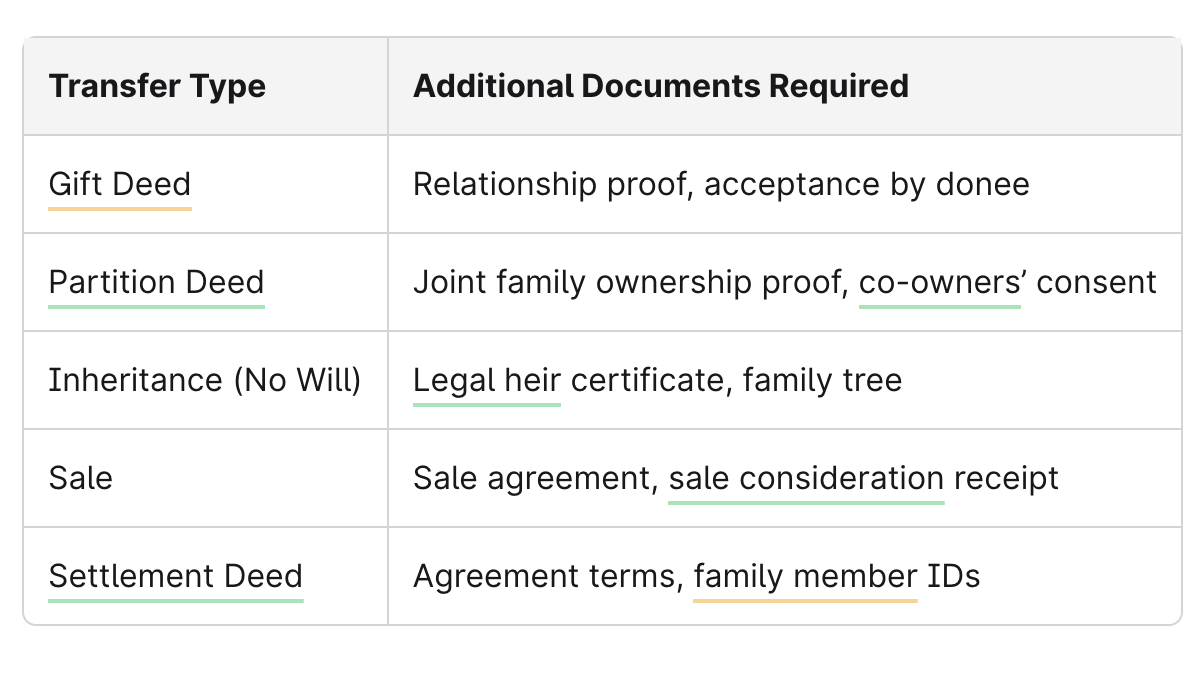Whether you're gifting your home to a loved one, inheriting your father's ancestral house, or completing a sale agreement, name transfer of property is a crucial legal process in India.
Without it, property ownership remains unclear, leading to disputes, delays, and even loss of rightful possession.
While there are several property transfer options, each has different legal requirements, applicable documents, and financial considerations.
This comprehensive guide will walk you through everything you need to know about property ownership transfer, including the required documents, the step-by-step process, and the role of laws like the Hindu Succession Act, Transfer of Property Act, and the Indian Registration Act.
What Is Name Transfer Of Property?
Name transfer of property refers to changing the ownership of the property from one person to another—whether through sale deed, gift deed, partition deed, settlement deed, or inheritance. The legal ownership is recorded in property records, and the new owner’s name appears in the municipal and revenue department's records.
This process becomes relevant in scenarios like:
- Buying or selling real estate
- Inheriting immovable property after someone’s death
- Dividing property between family members
- Gifting property during the donor’s lifetime
- Voluntary transfers without sale consideration
Each of these routes has its own legal document and registration obligations.
Common Property Transfer Options In India
Understanding the mode of transfer is key before diving into the documentation.

Key Documents Required For Name Transfer Of Property
Let’s break down the essential documents required across different types of property transfer:
1. Registered Title Deed or Sale Deed
- This is the primary legal document proving property ownership.
- A registered sale deed from the sub-registrar’s office is essential in sale-based transfers.
2. Previous Property Documents
- Mother deed, chain of ownership documents, and property records reflecting historical ownership.
- Ensures the property title is clear and undisputed.
3. Gift Deed / Partition Deed / Relinquishment Deed / Settlement Deed
- Depending on the transfer of ownership, the corresponding transfer deed is mandatory.
- Each must be drafted as a legally binding document and registered with proper stamp duty.
4. Will or Succession Certificate (in case of inheritance)
- If the property owner has passed away, the legal heirs need to produce either:
- A probated Will, or
- A succession certificate (issued by a civil court)
- Ensures compliance with intestate succession or personal laws (e.g., Hindu Succession Act).
5. Encumbrance Certificate
- Proves that the property is free from legal dues, mortgages, or loans.
- Obtainable from the sub-registrar's office for up to 30 years.
6. Property Tax Receipts / Municipal Tax Bill
- Confirms that all pending property tax has been paid.
- Often required to update records in the municipal office.
7. Khata Certificate and Extract (in some states)
- These are essential for property mutation and name changes in property records.
8. Identity Proofs and PAN Cards of Parties Involved
- Includes Aadhar card, PAN card, and passport-size photographs of both parties (transferor and transferee).
- PAN is especially necessary for determining capital gains tax liabilities.
9. No Objection Certificate (NOC)
- If the property is in a housing society or co-operative group, their NOC is essential.
- Sometimes also required from banks if property was under mortgage.
10. Affidavit / Declaration
- Declares the reason for name transfer, relationship with the existing owner, and voluntary nature of the transaction.
Additional Documents Based On Transfer Type

Legal Requirements & Process
Here’s how the property ownership transfer unfolds step by step:
Step 1: Prepare the Legal Document
Draft the appropriate transfer deed using the help of a legal professional. Ensure that:
- It includes details of property value
- Location and boundaries are clearly mentioned
- It states the mode of transfer and mutual consent
Step 2: Pay Applicable Stamp Duty
- Stamp duty varies by state, gender of recipient, and type of transfer (gift, sale, etc.)
- Women often get a stamp duty rebate in many Indian states.
Step 3: Register the Deed
- Visit the sub-registrar’s office with both parties and two Witnesses
- Submit:
- The original deed
- ID proofs
- Stamp duty and registration fees
- Ensure biometric scans, photographs, and signatures are captured.
Step 4: Apply for Mutation
- Mutation updates municipal records and tax records to reflect the new owner
- Required documents:
- Copy of registered deed
- Property tax receipts
- Identity documents
Financial Considerations
Before initiating a name transfer of property, keep the following financial factors in mind:
1. Stamp Duty and Registration Fees
- Charged as a % of property’s market value
- Can range between 3% to 9% based on location and type of deed
2. Capital Gains Tax
- Arises in sale deeds or in some cases of gifted property (if later sold)
- Exemptions apply under certain Income Tax Act provisions
3. Maintenance of Property Records
- Updating property tax records, mutation, and Khata entries may require periodic administrative fees.
4. Legal Fees
- Charges for legal document drafting, registration assistance, and representation
Legal Implications To Consider
- Rightful Ownership: Only the legal owner can transfer the property. Joint ownership or encumbrance can complicate the process.
- Legal Heirs & Consent: When dealing with ancestral property, all coparceners must agree before a valid transfer.
- Hindu Succession Act / Muslim Personal Law: Personal laws determine succession rights in the absence of a Will.
- Legally Sound Process: Failure to register or pay stamp duty makes the document invalid in the eyes of law.
- Financial Implications Post-Transfer: The new owner bears the property taxes, maintenance, and may face capital gains tax on sale.
Mistakes To Avoid
- ❌ Not registering the deed (especially for Gift Deeds and partition deeds)
- ❌ Ignoring mutation (municipal records stay in previous owner's name)
- ❌ Incomplete documentation (eg, missing sale consideration receipts or encumbrance certificate)
- ❌ Using a generic template without professional review
- ❌ Failing to check co-owners' consent or legal heir claims
Frequently Asked Questions
Q1. Can I transfer property ownership without a sale?
Yes. You can use a Gift Deed, relinquishment deed, or partition deed for voluntary transfer.
Q2. Do I need to pay stamp duty for inherited property?
No. Inheritance through Will or succession does not attract stamp duty, but mutation is still necessary.
Q3. What is the role of a legal heir certificate?
It verifies the relationship between the deceased and the legal heirs—needed in cases of intestate succession.
Q4. Is mutation proof of ownership?
No. It reflects occupancy for tax purposes. Ownership is established through registered deeds.
Q5. Can I transfer jointly owned property?
Yes, but you’ll need consent and signatures from all co-owners involved.
The Bottom Line: How Yellow Can Help
The name transfer of property may seem bureaucratic, but it’s a critical step in ensuring legal clarity, family harmony, and financial security.
Whether you're dealing with self-acquired property, ancestral assets, or settling family arrangements, having the right documents, a legally sound process, and professional support makes all the difference.
At Yellow, we can help you with all aspects of estate planning, including Wills, Trusts, Powers of Attorney, Gift Deeds, Legal Heir and Succession Certificates, and Living Wills. We also offer post-demise and asset transfer services. Our team of legal experts has more than 50 years of combined experience.




